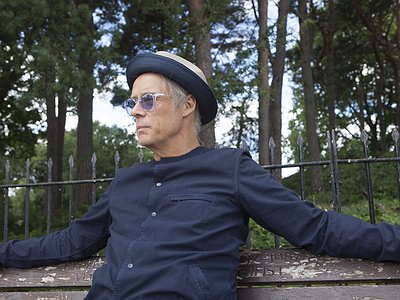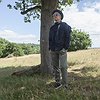Part 1
Name: David Sheppard
Nationality: English
Occupation: Composer
Current Release: Origin and Echo on Village Green
Recommendations: Philip Glass - Music in 12 Parts (Movement 1 - slow); Josef Škvorecký – The Bass Saxophone (novel)
Website / Contact: If you enjoyed this interview with David Sheppard, visit his profile on the website of Village Green Records to find out more. He also has a website at http://www.dsheppardmusic.com/about/.
When did you start writing/producing music - and what or who were your early passions and influences? What what is about music and/or sound that drew you to it?
Like many people, I was drawn to pop music from a very early age. My childhood was sound-tracked by glam rock on the radio and also by my elder sister’s Motown and Traffic singles and, later, albums by everyone from Neil Young and Bonzo Dog to classical recordings of Grieg and Tchaikovsky. It was all the same to the pre-adolescent me. All music was a portal to exotic and exciting worlds beyond my everyday suburban existence. Later, when I discovered the likes of David Bowie and Brian Eno, and the many musical doors that they opened, I realised that there were even more exotic and exciting worlds to be immersed in.
I also had a particular reverence for musical instruments, regarding them as almost mystical objects. I played glockenspiel in the junior school orchestra, but I was actually afraid of the instrument – there were so many gleaming notes! I have an elder brother who played guitars, basses and so on, so instruments were always around the house, and although I couldn’t get a meaningful sound out of any of them to begin with, I eventually learned to bend them to my will, at least a little. He also had a band and they would sometimes practice in our family garage. I used to wander in there after they’d finished just to stare at the drum kit – this big, shining, mythic object, like a sculpture or a space ship. Sometimes I even dared touch it.
For most artists, originality is first preceded by a phase of learning and, often, emulating others. What was this like for you? How would you describe your own development as an artist and the transition towards your own voice? What is the the relationship between copying, learning and your own creativity?
From an early age I liked music when it delivered moments of inexplicably sublime uplift or ineffably exquisite melancholy, moments of sort of existential ‘starburst’ purity! They seem to affirm what it is to be human, somehow. Perhaps all art strives for this kind of effect on some level. I spent many years wanting to create these effects in my own music, but for a long time I felt I was not armed with sufficient tools or skills to achieve them. I only later realised that often such moments arrive through chance or by loosening control of the compositional process in some way and allowing accidents and random patterns or permutations to occur. Eventually I discovered that rather than trying to copy an existing sonic vocabulary it was better to mimic procedures, systems or processes (whether drawn from music or elsewhere) and then apply them to an original palette.
What were your main compositional- and production-challenges in the beginning and how have they changed over time?
I am entirely self-taught, so I have learned to play miscellaneous instruments in curious and unorthodox ways. For a while this felt like an impediment, but over time, I’ve come to realise that restrictions can be useful for composition. I actually play the guitar quite well, but I find I only write interesting things on it when I am a little lost – using unorthodox tunings or by preparing the instrument in some way.
Production, I find, is largely about imagination. Picturing a sonic environment is part of my compositional process. Actually achieving, or at least getting close to, this imagined place when in the studio can sometimes be a laborious business, but then there are those aforementioned happy accidents … Sometimes composing or ‘producing’ music is simply about catching things as they go past before they are lost forever.
What was your first studio like? How and for what reasons has your set-up evolved over the years and what are currently some of the most important pieces of gear for you?
I’ve never really had ‘a studio’ of my own, as such, although I do have favourite studios and people I like working with. I actually like the discipline of going into a specific environment to record and then leaving it at the end of the day to reflect upon the work elsewhere. Obviously, I have a certain amount of equipment and instruments at home with which to write, but this is pretty basic and has not really changed very much over the years.
How do you make use of technology? In terms of the feedback mechanism between technology and creativity, what do humans excel at, what do machines excel at?
I use whatever I think will achieve the spatial, textural, rhythmic or even emotional trigger I am seeking. That could mean inserting pencils beneath the strings of a guitar and hitting them with marimba mallets or setting up an elaborate chain of modular synths and effects pedals. Whatever it takes. I don’t think machines excel at anything creative on their own per se – even a sequencer has to have information fed into it by a human. I think breaking down or blurring the distinction between the human and the mechanical might actually be one of the key definitions of popular music production.
Production tools, from instruments to complex software environments, contribute to the compositional process. How does this manifest itself in your work? Can you describe the co-authorship between yourself and your tools?
I’m not much of a gear-hound or production/studio geek. A lot of what I do is a response to whatever tools or environment are to hand. As I said, I quite like restrictions. Also, I make no real distinction between the ‘technology’ of an ocarina, a prepared grand piano or a Space Echo effects unit, but I do like setting up processes or systems that allow or even provoke surprises or chance compositional occurrences. That said, I did write some of Origin and Echo by building primitive digital synths and editing samples on my iPad, but that’s about as technologically complex as I’ve ever got, and now I’m itching to use a completely analogue palette again.
Collaborations can take on many forms. What role do they play in your approach and what are your preferred ways of engaging with other creatives through, for example, file sharing, jamming or just talking about ideas?
I am very self-sufficient and will work on pieces, sometimes obsessively, until I feel they’re delivering what I want. Occasionally this isn’t possible and there are parts or instruments that I imagine but am not capable of playing. That’s when I tend to call in collaborators. Sometimes I will give them a very specific brief, but it’s also exciting to just let someone else into your territory and allow them the freedom to add their own personality and colour to the work. Sometimes they illuminate elements in the music that were already there but which had gone unnoticed.
Some other projects I’m involved in are more collaborative by definition, and these situations often come about as a result of shared enthusiasms, usually expressed through talking then playing/improvising or simply swapping rough sketches or ideas.






